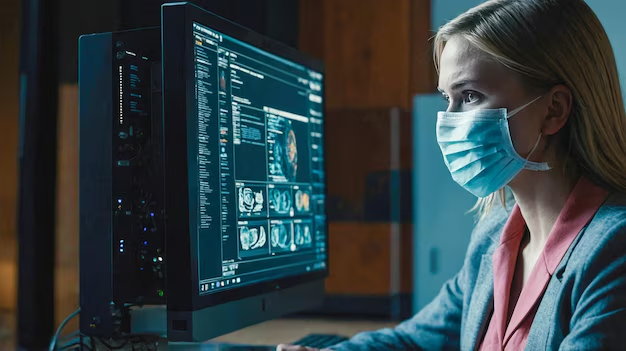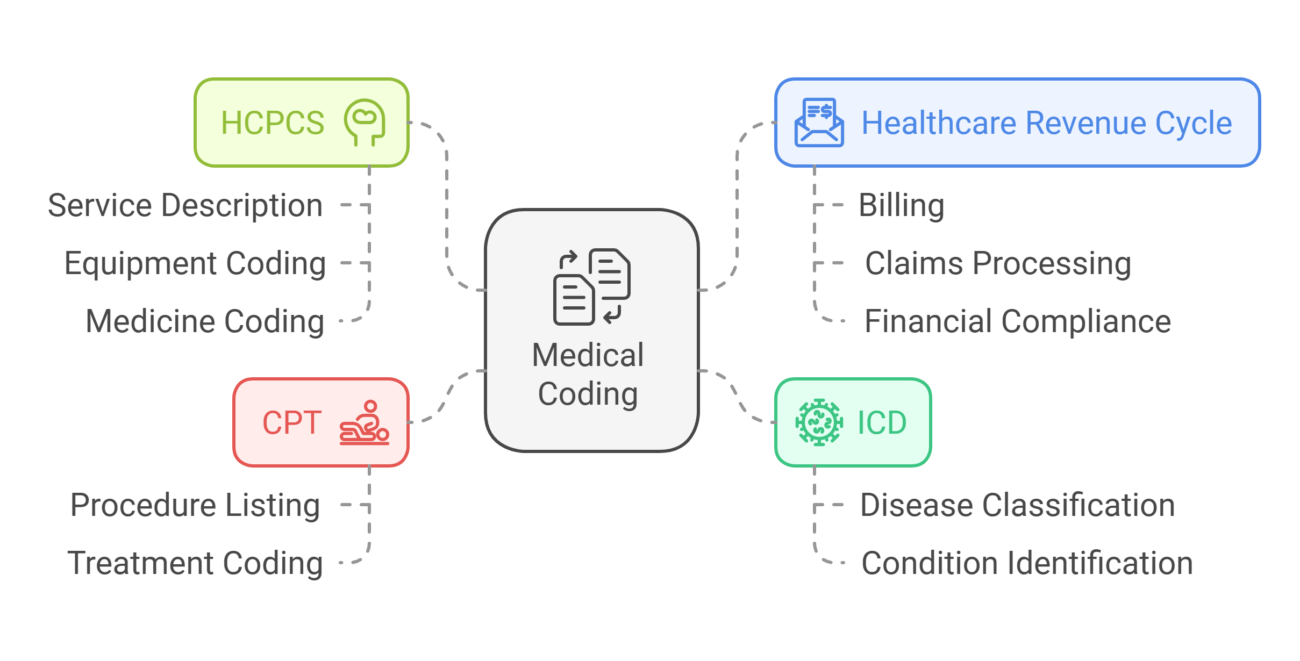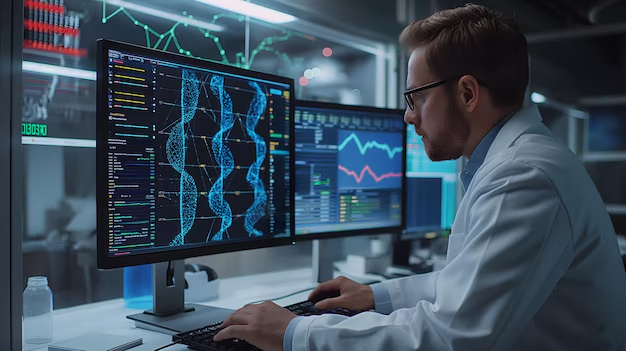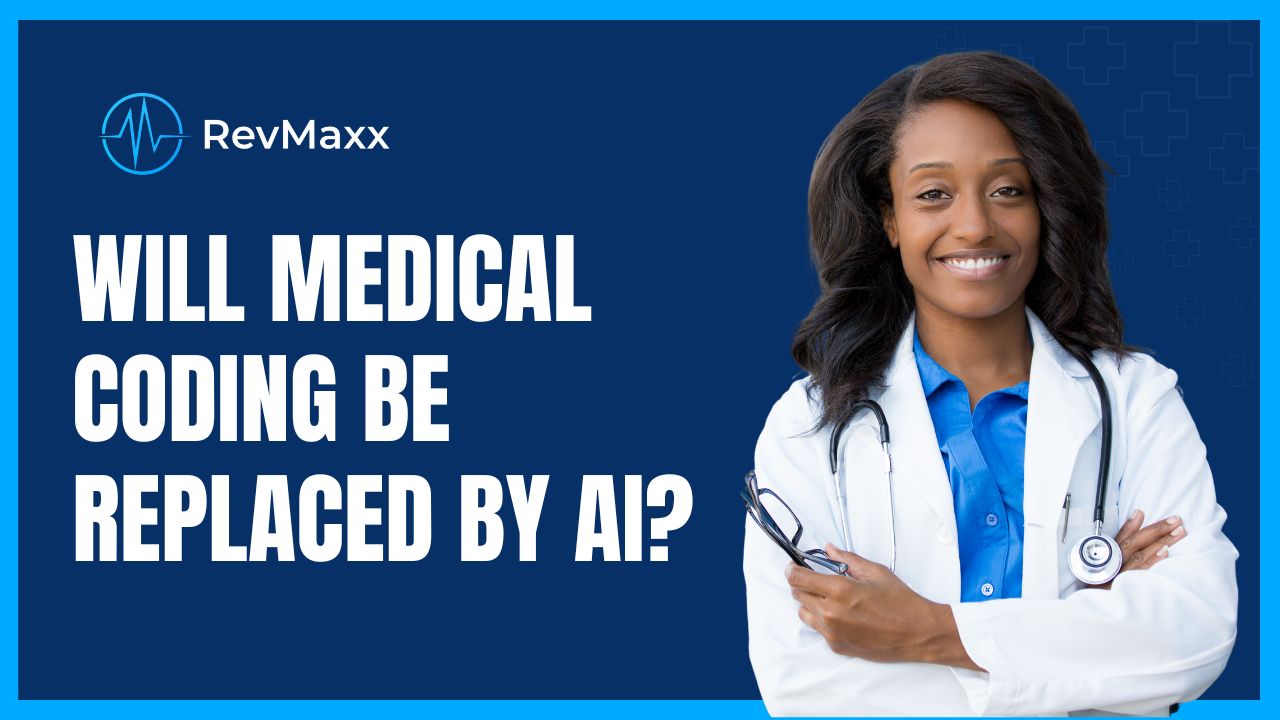As technology advances, there is a big question that many people are asking: “Will medical coding jobs be replaced by AI?”
Well, medical coding is the process of turning a patient’s health information into codes that are used for billing and research. AI, or artificial intelligence, can help by speeding up the coding process and reducing mistakes.
But the question is: will it completely take over?
While AI is very powerful and can do many things faster than humans, medical coding still needs human expertise. Medical Coders make important decisions based on their knowledge and understanding of complex cases. This is the place where AI might struggle with.
Instead of replacing human coders, AI will likely work alongside them to make their jobs easier and more efficient. Human skills and AI can work together to improve healthcare for everyone.
Today in this blog post, we will explore the impact of AI on medical coding, the benefits and challenges, and what the future might look like.

What is Medical Coding?
Medical coding is the process of transforming healthcare diagnoses, treatments, medical services, and equipment into universal alphanumeric codes. These codes are used by hospitals and doctors to keep track of patient care and to bill insurance companies.
There are three main types of codes used:
- ICD (International Classification of Diseases): For naming diseases or medical conditions.
- CPT (Current Procedural Terminology): For listing medical treatments and procedures.
- HCPCS (Healthcare Common Procedure Coding System): For describing services, equipment, and medicines.
Medical coding plays a crucial role in the healthcare revenue cycle, facilitating billing, claims processing, and overall financial management. Proper coding is essential to avoid errors, ensure compliance with regulations, and maintain accurate patient records.

Why Use AI in Medical Billing?
You might wonder if AI (artificial intelligence) will replace medical coders and billers. To understand this, we first need to ask why businesses might use AI for medical billing.
The answer is simple: AI can process claims (requests for payment) much faster than humans. This advanced technology can quickly go through large amounts of data and find the right information without making any mistakes.
According to a survey, AI could handle more than 80% of medical claims with little or no help from humans.
If AI could fully take over the medical billing and coding process, doctors’ offices and billing companies could make more money. They can get fewer claim rejections, and have an easier time submitting claims. This would also give staff more time to focus on taking care of patients and running the office smoothly.
AI in medical billing offers several advantages:
- Speed: AI can analyze medical documents much faster than humans. This means that billing processes can be completed quicker.
- Accuracy: AI is less likely to make mistakes compared to humans, who might get tired or distracted.
- Cost-Effective: Using AI could reduce the need for a large number of medical coders, which might lower operational costs for healthcare providers.
A survey conducted by Black Book Market Research found that by 2022, 90% of healthcare executives planned to invest in AI-powered solutions to streamline medical billing and coding, with AI expected to reduce overall administrative costs by 30-50% in the next few years.
AI’s Potential Impact on Medical Coding
Think of AI as a supercharged medical dictionary. It considers the patient’s symptoms, history, and current coding rules, making it smart and up-to-date.
AI doesn’t just observe – it actively suggests codes based on the diagnosis and context, saving medical coders time. As coders pick or reject the AI’s suggestions, the system learns and improves, becoming more accurate over time. This partnership between AI and coders makes the coding process faster and reduces errors.
- Spotting Missing or Conflicting Information
Humans can miss mistakes, like a missing code or conflicting medication details in a medical record. AI, however, is great at spotting patterns in huge amounts of data. If a diagnosis is listed but a matching procedure code is missing, AI will catch it. Or if two reports have different information about a patient’s medication, AI can flag the issue for the coder to fix. By recognizing these patterns, AI helps ensure that everything is accurate and complete.
- Allowing Coders to Focus on Complex Cases
Since AI handles the routine tasks like pre-filling codes and finding missing information, coders have more time to focus on tougher cases, such as rare diseases. This allows coders to use their medical knowledge for more complex work while still ensuring accuracy.
The benefits of this teamwork are huge. Coders get more time to improve their skills, and AI makes sure everything runs smoothly. But AI isn’t here to replace coders – it works alongside them. Coders still play a vital role in making complex decisions that AI can’t handle on its own. Together, they make medical coding faster, more accurate, and better for patient care.
Read this blog on How Medical Coding AI Transforms Healthcare Industry? to learn more on AI in Medical Coding.
Will AI Replace Medical Coders?
The big question is whether AI will completely replace human medical coders. Even though AI is very smart, the answer is no – AI won’t completely replace medical coders.
According to the AAPC, the global medical coding market was valued at $16.5 billion in 2021 and is expected to grow at a compound annual growth rate (CAGR) of 10.6% through 2026, demonstrating that demand for medical coders remains high even as AI solutions are being implemented.
Here’s why:
- Understanding Complex Information:
Medical coding isn’t just about matching words to codes. It involves understanding complicated medical records and details. AI sometimes has trouble with the way people use language, especially in tricky situations. Human coders are important because they can use their judgment to solve confusing problems and follow changing coding rules.
- Adapting to Changing Healthcare Rules:
Healthcare rules and coding guidelines change a lot. Human coders are good at adjusting to these changes and thinking critically about how to apply new rules. They can also communicate with doctors and other healthcare workers to make sure the information is clear and correct. This kind of teamwork is something AI can’t do well right now.
So, there is no surprise that AI can help coders, but it can’t replace their skills and human understanding.
Can AI Deal with Complex Medical Records Like Humans Do?
One of AI’s weaknesses is that it struggles with complex or unusual cases. While AI can quickly recognize patterns and apply codes for standard treatments, it may have difficulty understanding a complicated case where a patient has multiple conditions. Humans, on the other hand, are better at making sense of tricky situations and can make decisions that require critical thinking.
Manual Medical Coding Vs. AI-powered Medical Coding
So, what’s the difference between manual medical coding and AI-powered medical coding? Here’s a breakdown:
- Manual Medical Coding: Human coders read patient charts and assign codes based on their understanding of the patient’s condition and treatment.
- Pros: Coders can make judgments about difficult cases, handle complex situations, and communicate with doctors if something isn’t clear.
- Cons: It can be time-consuming, and there’s a chance for human error.
- AI-Powered Medical Coding: AI software scans medical records and suggests the right codes based on algorithms and data patterns.
- Pros: AI is fast and highly accurate with simple cases. It can process large amounts of data quickly.
- Cons: AI may struggle with complicated medical records and can make mistakes if the data is unclear or incomplete.
Limitations of AI in Medical Coding
While AI is useful, it has some limitations:
- Inability to Handle Ambiguity: AI can’t handle situations where medical records are vague or confusing. Human coders are better at interpreting these cases.
- Need for Human Oversight: Even with AI, human coders are still needed to review and approve codes, especially for more complicated cases.
- Learning Period: AI systems need to be trained on a vast amount of data before they become effective. This can be time-consuming.
Challenges of AI in Medical Coding
Introducing AI into medical coding also comes with challenges:
- Implementation Costs: Setting up AI systems can be expensive for healthcare organizations.
- Training Needs: Medical coders will need to learn how to work with AI, which means additional training.
- Data Privacy: AI systems handle sensitive patient information, so they need to be highly secure to protect privacy.
Impact on Medical Billing and Healthcare Costs
AI could also change medical billing and overall healthcare costs. By automating many tasks, AI has the potential to reduce costs for hospitals and clinics. This could lead to lower healthcare costs for patients. However, there are also concerns about the initial costs of implementing AI systems.

How Medical Coders Can Adapt
So, what does all this mean for medical coders? Instead of fearing that AI will replace them, coders can learn to adapt and work alongside AI. Here’s how:
- Learn New Skills: Coders can expand their skills to include working with AI tools and software.
- Focus on Complex Cases: As AI takes over routine tasks, coders can specialize in more complex medical records that require human understanding.
- Stay Updated: Technology is always changing, so coders should continue to stay informed about the latest advancements in AI and medical coding.
The Future of Medical Coding
The future of medical coding will likely be a mix of AI and human coders working together. AI will handle routine, repetitive tasks, allowing human coders to focus on more challenging cases. This partnership between AI and coders could make the medical coding process faster and more accurate than ever before.
You can also read our previous blog on The Role of AI in Enhancing Medical Coding Accuracy for FQHCs.
How RevMaxx Introduces AI in Medical Coding?
We combine AI with human expertise to improve medical coding. Our AI medical scribe handles routine tasks, quickly analyzing records and suggesting codes, saving time and reducing errors. Human coders then review complex cases to ensure accuracy and compliance.
Our approach boosts efficiency without replacing human coders—AI takes care of repetitive work, while people handle the tough decisions.
Discover more at RevMaxx.
Conclusion
As AI continues to transform the world of medical coding, we stand at the forefront, blending advanced AI technology with human expertise to streamline coding processes. At RevMaxx ai medical scribe, we understand that while AI is excellent at handling routine tasks, human coders bring the critical thinking and adaptability needed for complex cases. Our platform is designed to empower medical coders, using AI medical scribes to speed up simple tasks while allowing humans to focus on nuanced and intricate records.
By integrating AI into our workflow, RevMaxx enhances accuracy, reduces errors, and ensures compliance with ever-changing healthcare regulations. We believe in a future where AI supports, rather than replaces, the expertise of medical coders, ensuring faster, more reliable coding that improves healthcare for both providers and patients.
Ready to experience the future of medical coding? Get a FREE DEMO and see how AI can work with you, not instead of you.
Use AI Medical Scribes to Transform your Medical Documentation
RevMaxx, the AI-driven medical scribe, empowers healthcare providers to focus on what matters most—patient care. By automating documentation and improving workflow efficiency, RevMaxx helps reduce burnout in physicians, hospitals, and emergency departments.
We do all your SOAP notes with automated ICD-11 and ICD-10 Coding. Enhance your clinical documentation with RevMaxx’s AI-powered medical scribe.









